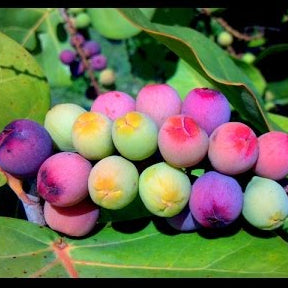Love it? Add to your wishlist
Your favorites, all in one place. Shop quickly and easily with the wishlist feature!
[message]
[title]
[message]



Veliyath Gardens
Couldn't load pickup availability
In the Caribbean: Uva de Playa (Beach Grape)
In South Florida (USA): Commonly referred to as Sea Grape
In the Bahamas: Known locally as Bay Grape
The Sea Grape is not just a fruit-bearing plant—it’s a symbol of tropical elegance, resilience, and utility. Indigenous to coastal regions of the Caribbean and the tropical Americas, this evergreen shrub or tree adds immense value both as a hardy ornamental and as a source of fruit, traditional medicine, and high-quality wood. From its thick, leathery leaves that dance in sea breezes to its cascading clusters of purplish berries, every part of the Sea Grape plant contributes to its charm and usefulness.
Adaptable Height:
Depending on location and care, Sea Grape can remain a low, wind-resistant coastal shrub around 1 meter tall or grow into a stately tree reaching up to 15 meters under fertile, sheltered conditions.
Maintenance Requirements:
This plant thrives in sandy or well-drained soils, requires minimal watering once established, and is highly tolerant of saline environments—ideal for seaside gardens and urban landscaping alike.
Lifespan and Durability:
Once rooted, the Sea Grape plant is long-living, resistant to drought, wind, and salt spray, and demands only light pruning to maintain shape.
Fruit Description:
Sea Grape fruits resemble small, purplish grapes, 2 cm wide, growing in tight, pendant-like bunches. Their thin skin surrounds soft, juicy pulp and a central pit.
Flavor Profile:
The fruit offers a mildly sweet to tangy-sour flavor, depending on ripeness, often compared to a wild grape or lightly fermented berry.
Culinary Uses:
Fresh eating: The fruit is often eaten straight from the tree.
Preserves and jellies: Its natural pectin content makes it excellent for traditional jams and jellies.
Fermentation: In some cultures, Sea Grape is used to produce homemade wine or vinegar.
Tart sauces and syrups: Often paired with tropical dishes for contrast and depth.
Rich in Vitamin C – Boosts immune health and skin vitality.
Source of natural antioxidants – Helps in cellular repair and oxidative balance.
Mild diuretic effects – Traditionally used to support kidney function.
Supports digestion – The fibrous pulp aids in healthy bowel movements.
Anti-inflammatory use – Folk remedies use leaf decoctions for joint pains and skin rashes.
These benefits make Sea Grape not just a beachside delicacy but also a health-enhancing addition to home gardens.
Caribbean Heritage:
In coastal Caribbean communities, the Sea Grape is more than a fruit—it’s part of cultural memory. Harvesting Sea Grapes in late summer is a cherished seasonal ritual.
Medicinal Use in Folklore:
Decoctions from leaves, bark, or roots are applied topically or consumed in small doses for various minor ailments including sore throats, fever, and indigestion.
Woodworking Tradition:
The wood of mature Sea Grape trees is valued in local craftsmanship for furniture, cabinets, and carving due to its density and attractive grain.
Short-Term Storage:
Fresh Sea Grapes can be stored in cool, dry conditions for a few days. Light refrigeration preserves flavor but may reduce texture.
Long-Term Use:
Jam and jelly making is the most common way to preserve the fruit while enhancing its shelf life.
Fermentation into wine is another traditional preservation method, used especially in tropical festive preparations.
Drying the leaves is practiced by herbalists for later use in traditional decoctions.
Coastal Erosion Control:
Sea Grape’s dense root systems bind the soil, making it an excellent natural barrier against coastal erosion.
Ornamental Appeal:
Its broad, round leaves often turn bronze or red at the edges, creating year-round visual interest. The unique foliage and trailing fruit clusters offer a tropical accent to garden landscapes.
Wildlife Friendly:
The plant supports pollinators, especially bees, during its flowering phase and provides food for birds and small mammals.
For Garden Enthusiasts:
Sea Grape is a low-maintenance, landscape-transforming plant that thrives with minimal effort and adapts well to containers, borders, and coastal hedges.
For Culinary Explorers:
Add its unique fruit to your home recipes, from fresh garden snacks to homemade jams or artisan wine.
For Health-Focused Living:
Regular use of its fruit or herbal decoctions can naturally supplement wellness routines without processed additives.
For Sustainable Living:
Growing Sea Grape contributes to local ecology and reduces reliance on chemical-laden decorative shrubs or synthetic products.
At Veliyath Gardens, we offer healthy, nursery-raised Sea Grape plants, ideal for Indian tropical and coastal environments. Carefully nurtured and ready to adapt, these plants are an exceptional choice for gardeners, health seekers, and heritage lovers. Whether for fruit, foliage, or environmental value, your Sea Grape plant will become a lasting part of your green space.
From seaside traditions to sweet preserves and lush garden hedges, the Sea Grape (Coccoloba uvifera) is a treasure trove of benefits. Its strength, elegance, and edible richness make it a must-have tropical addition for those who value beauty, health, and culture in their garden journey. Start growing your own today—experience nature’s flavor and heritage in one graceful plant.
Adaptable Height:
Depending on location and care, Sea Grape can remain a low, wind-resistant coastal shrub around 1 meter tall or grow into a stately tree reaching up to 15 meters under fertile, sheltered conditions.
Maintenance Requirements:
This plant thrives in sandy or well-drained soils, requires minimal watering once established, and is highly tolerant of saline environments—ideal for seaside gardens and urban landscaping alike.
Rich in Vitamin C – Boosts immune health and skin vitality.
Source of natural antioxidants – Helps in cellular repair and oxidative balance.
Mild diuretic effects – Traditionally used to support kidney function.
Supports digestion – The fibrous pulp aids in healthy bowel movements.
Sea Grape plants, ideal for Indian tropical and coastal environments. Carefully nurtured and ready to adapt, these plants are an exceptional choice for gardeners, health seekers, and heritage lovers. Whether for fruit, foliage, or environmental value, your Sea Grape plant will become a lasting part of your green space.




